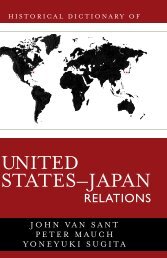Private Academies of Chinese Learning in Meiji Japan: The Decline ...
Private Academies of Chinese Learning in Meiji Japan: The Decline ...
Private Academies of Chinese Learning in Meiji Japan: The Decline ...
Create successful ePaper yourself
Turn your PDF publications into a flip-book with our unique Google optimized e-Paper software.
200 PRIVATE ACADEMIES OF CHINESE LEARNING IN MEIJI JAPANHakutei (1882–1958). After graduat<strong>in</strong>g from higher elementaryschool <strong>in</strong> 1894, he studied mathematics and English <strong>in</strong>preparation for the entrance exam<strong>in</strong>ations <strong>in</strong>to middle school.For English, he attended a juku near his school from 7.30 a.m. andfor mathematics he went to the home <strong>of</strong> a teacher after school, at4.30 p.m. 82 This change was a result <strong>of</strong> direct <strong>in</strong>tervention fromthe authorities <strong>in</strong> the runn<strong>in</strong>g <strong>of</strong> juku and <strong>of</strong> the socialtransformations which meant that a juku education was notsufficient for success.When did this change take place? <strong>The</strong>re is no clear answer tothe question. On the one hand, there is mention <strong>of</strong> study<strong>in</strong>gkangaku at a teacher’s home out <strong>of</strong> school hours as late as theearly twentieth century. From his second year at the First HighSchool until his graduation from university, Nagasawa Kikuya(1902–80; bibliographer, pr<strong>of</strong>essor) was among the private pupils<strong>of</strong> Yasui Bokudō, spend<strong>in</strong>g most Sundays at his home. 83 Eventoday not all juku attendance is specifically aimed at prepar<strong>in</strong>gfor an entrance exam<strong>in</strong>ation. On the other hand, althoughprepar<strong>in</strong>g for exam<strong>in</strong>ations appears to become the most commonfunction <strong>of</strong> a juku from around 1900, people were study<strong>in</strong>g atjuku, <strong>in</strong>clud<strong>in</strong>g kangaku juku, while prepar<strong>in</strong>g for exam<strong>in</strong>ationswell before then. While the Education Law established the l<strong>in</strong>kbetween education and worldy success, entry <strong>in</strong>to the highest<strong>in</strong>stitutions <strong>of</strong> learn<strong>in</strong>g required academic atta<strong>in</strong>ments that couldnot be acquired <strong>in</strong> the lower level public schools. As a result, asearly as the 1870s, juku functioned as preparatory schools to fillthis gap <strong>in</strong> provision.For example, Hiroike Chikurō (1866–1938), who graduatedfrom a middle level school <strong>in</strong> Nakatsu, attended a juku between1883 and 1885 to prepare for the entrance exam<strong>in</strong>ation <strong>of</strong> theteacher tra<strong>in</strong><strong>in</strong>g school. After fail<strong>in</strong>g the exam<strong>in</strong>ation for thesecond time he eventually passed the teacher qualify<strong>in</strong>gexam<strong>in</strong>ation, which was equivalent to graduation from theschool. 84 For youths com<strong>in</strong>g to Tokyo from the prov<strong>in</strong>ces, whereeducational provision beyond elementary level was lack<strong>in</strong>g,study at a juku was <strong>of</strong>ten a temporary measure until they couldga<strong>in</strong> entrance <strong>in</strong>to a more formal school. Nishō gakusha and OkaSenj<strong>in</strong>’s juku were ma<strong>in</strong>ly attended by people prepar<strong>in</strong>g forentrance exam<strong>in</strong>ations <strong>in</strong> the 1880s.Still, a shift def<strong>in</strong>itely occurred <strong>in</strong> the role <strong>of</strong> the juku from anun<strong>of</strong>ficial (and barely tolerated) part <strong>of</strong> educational provision,













